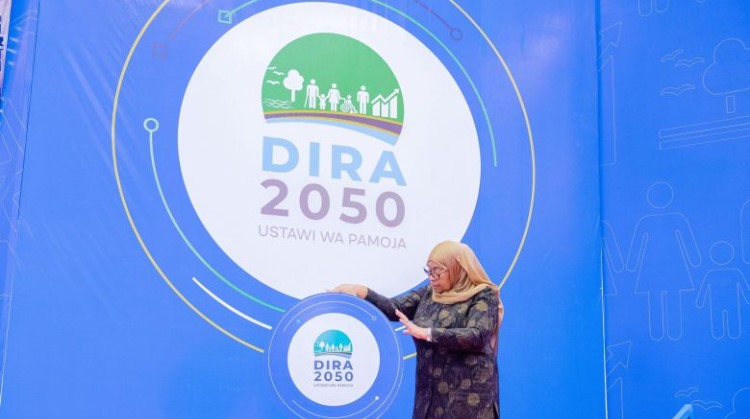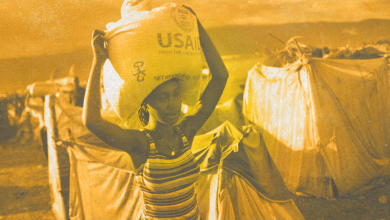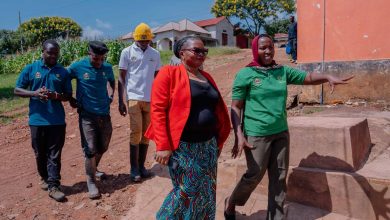Learning from China: Policy dialogue guides Dira 2050

THE policy dialogue convened by the Economic and Social Research Foundation (ESRF), a distinguished Tanzanian think tank, took place last week and drew esteemed scholars and researchers from China.
This marked the third iteration of the dialogue in Tanzania, building on the second held in China and signals the deepening of Beijing’s support for least developed countries, including Tanzania.
The high-level exchange, organised jointly by ESRF and the College of International Development and Global Agriculture (CIDGA) at China Agricultural University, demonstrated ESRF’s growing role in fostering strategic, solutionsdriven discussions on national development. It facilitated research-based conversations that explored viable policy options and strengthened understanding of development management in the country.
CIDGA, established in 2017, focuses on transdisciplinary areas such as international development and global agribusiness. It aims to integrate research and capacity-building using both “bringing-in” and “going-out” approaches, enabling mutual learning between China and its global partners.
As a participant representing TIB Development Bank, a policy bank mandated to support national development, I had the privilege of engaging in in-depth discussions on innovative financing strategies for strategic projects.
These exchanges involved highly regarded Chinese economists such as Prof Li Xiaoyun, Chair, Professor and Honorary Dean of CIDGA; Prof Xu Xiuli, Dean of CIDGA and Prof Xue Lan, Distinguished Professor and Dean of Schwarzman College at Tsinghua University.
From Tanzania, I interacted with Prof Provident Dimoso, Deputy Rector of the Institute of Rural Development Planning; renowned economist Prof Samuel Wangwe, Founding Executive Director and Principal Research Associate at ESRF and Mr Peniel Lyimo, former Permanent Secretary to the Treasury and a respected public servant.
A key highlight of the dialogue for me was engaging with Prof Li Xiaoyun, the esteemed author of The End of Poverty and the Taming of Inequality— A Manifesto for Personal and Social Action (ISBN 978-981- 96-0683-2), published by CITIC Press Group in 2025.
Driven by my own curiosity for development knowledge, I strongly recommend that Tanzanian leaders consider this timely work. Spanning 254 pages, the book offers a compelling call to action: Empower individuals to take charge of their futures, backed by effective government and societal support.
It details the multi-dimensional nature of poverty and the comprehensive strategies needed to reduce inequality— lessons that are particularly relevant as Tanzania embarks on its Dira 2050 journey.
ALSO READ: Govt prioritises irrigation to drive Vision 2050
Prof Li combines practical insights and moral philosophy with real-life accounts from Chinese villages to offer a rich narrative on poverty. He argues that poverty is not a remote or isolated issue, but a collective challenge that requires holistic, people-centred solutions.
The book encourages policymakers and citizens alike to rethink their roles and interventions. Beyond the text, the ESRFCIDGA dialogue created space for a broader public appreciation of the economic and social benefits arising from stronger South–South partnerships.
The event underscored the enduring collaboration between ESRF and CIDGA, which began in 2017 with a high-level thinkers’ dialogue in Dar es Salaam focused on trade and investment. The initial dialogue was followed by a session in Beijing last April, where Tanzanian institutions engaged with CIDGA to reflect on the long-standing development cooperation between Dodoma and Beijing.
The second forum took place later in the year in Dar es Salaam, centring on comparative development pathways between China and Africa and showcasing how Chinese agricultural models—like “small technologies, big harvests” and “little beans, big nutrition”—are being adopted in Tanzania.
The most recent dialogue extended this conversation by exploring the Global South’s evolving role in global governance, with a nod to the China-Africa Cooperation Forum (FOCAC), established in 2000.
Like previous dialogues, this third iteration reinforced principles of solidarity, cooperation and a shared aspiration for a more inclusive global order. One of the more pressing topics discussed was ensuring that the voices of the poor are heard—representing the needs of the majority of the global population.
This includes addressing power imbalances in international institutions like the UN, IMF and World Bank, which have historically been dominated by Global North interests. A particularly thought-provoking topic was the changing landscape of development financing.
Many developing countries, including Tanzania, are experiencing shrinking aid flows from traditional donors, illustrated by the winding down of USAID’s operations.
This shift calls for new strategies and greater reliance on homegrown solutions and South–South cooperation. In this context, TIB Development Bank’s participation was timely. With a mandate to offer competitive financing for national projects, especially those promoted by both public and private sectors, TIB is positioned to explore and champion alternative development financing models suitable for the realities of the Global South.
For Tanzania, the dialogue offered valuable insights into how these issues—though global in scale—bear direct implications for our national policies and long-term planning. It came at a critical juncture as Tanzania begins to implement Vision 2050 and it highlighted how strategic partnerships and intellectual collaboration can help steer this vision to success.
Participating in such discussions will be crucial in shaping our approach to Dira 2050 implementation. Aligning longterm frameworks with global equity goals—through perspective plans, national strategies and medium-term targets—will help ensure that the country’s development path is inclusive and resilient.
The Global South, comprising countries in Africa, Asia, and Latin America, is increasingly asserting its place in global decision-making. It advocates for a fairer international order, pushing for stronger representation and challenging entrenched power structures.
Advancing South–South cooperation is key to creating new models for development, finance and trade. By strengthening platforms such as BRICS and similar regional coalitions, the Global South is promoting shared development agendas rooted in sustainable growth, climate justice, food security and debt relief.
These partnerships encourage context-specific, locally owned solutions and resist onesize-fits-all policies imposed by distant powers.
These ideas are increasingly shaping global standards in trade, digital autonomy, ecological stewardship and security—all issues of direct relevance to Tanzania’s future. As such, reflections from the ESRF-CIDGA dialogue are not merely academic—they offer practical pathways to enrich our national planning frameworks, particularly as we refine the Dira 2050 agenda.
ALSO READ: Dira 2050 blueprint in motion
In conclusion, dialogues such as these are essential in fostering intellectual exchange, policy innovation and sustainable development strategies. Tanzania’s partnership with China, exemplified by initiatives like the ESRF-CIDGA dialogue, offers a chance to tap into practical experience, fresh thinking and transformative potential.
As we continue to pursue our long-term goals, embracing such platforms can enhance national resilience and ensure our policies are in step with both global changes and local aspirations.





